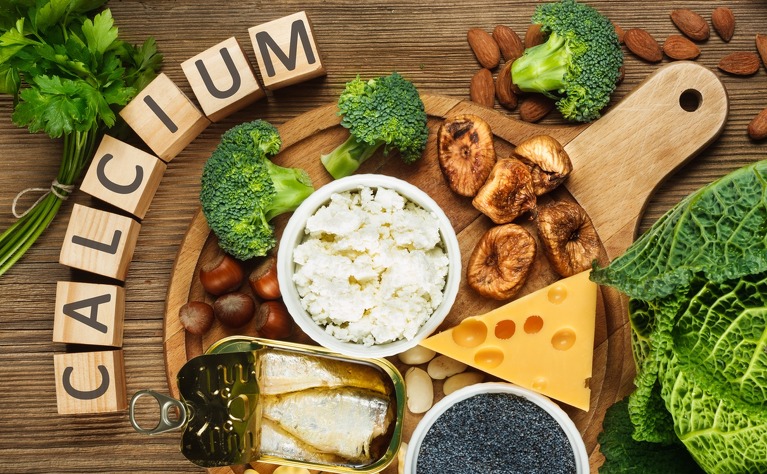
Calcium
Calcium, the most abundant mineral in the body, is found in some foods, added to others, available as a dietary supplement, and present in some medicines. Serum calcium is very tightly regulated and does not fluctuate with changes in dietary intakes; the body uses bone tissue as a reservoir for and source of calcium to maintain constant concentrations of calcium in the blood, muscle, and intercellular fluids. The bone itself undergoes continuous remodeling, with constant resorption and deposition of calcium into new bone—the balance between bone resorption and deposition changes with age. Bone formation exceeds resorption in periods of growth in children and adolescents, whereas both processes are relatively equal in early and middle adulthood. In aging adults, particularly among postmenopausal women, bone breakdown exceeds formation, resulting in bone loss that increases osteoporosis risk over time.
Calcium Health Benefits:
Calcium is required for vascular contraction and vasodilation, muscle function, nerve transmission, intracellular signaling, and hormonal secretion, though less than 1% of total body calcium is needed to support these critical metabolic functions.
Calcium is key to growing new bone and keeping the bone strong. There is good evidence it can help prevent or control high blood pressure. It may also ease PMS symptoms and play a role in preventing certain cancers. Some researches show that calcium with vitamin D, for instance, may help protect premenopausal women from breast cancer.
Calcium Sources:
Dairy products such as milk, cheese, and yogurt
Leafy, green vegetables such as spinach, broccoli, avocado, okra, collards, and kale
Fish with soft bones, such as canned sardines and salmon
Calcium-enriched foods such as breakfast cereals, fruit juices, soy and rice drinks, and tofu. Check the product labels
Beans like white beans, soybeans, and flat beans are also an excellent way to add calcium to the diet.
Daily Recommended Calcium Intake:
Age is the main factor in determining the daily intake of calcium. Babies up to 6 months of age should get about 1000 mg of calcium per day. Infants in the 7- to 12-month age range need 1500 mg. Children up to the age of 8 should consume 2500 mg, while children between 9 to 18 years need 3000 mg of calcium daily. For adults from 19 to 50 years, the calcium required is 2500 mg. 51 years and older people need 2000 mg of calcium daily.
Calcium Deficiency:
Calcium deficiency is a severe side effect because it could lead to secondary hyperparathyroidism, increased bone resorption, and perhaps also peripheral bone loss and osteomalacia.
Calcium deficiency is usually due to vitamin D deficiency, either through a dietary deficiency or lack of sunlight exposure.
The most common causes for this deficiency are:
Reduced hydrochloric acid
Low intake of certain nutrients
Intestinal bypass
The consequences usually include loss of bone health (osteopenia, osteoporosis, evidence of increased bone remodeling, a steady increase in parathyroid hormone (PTH)), brittle nails, and susceptibility cavities, hypertension, insomnia, and irritability.




